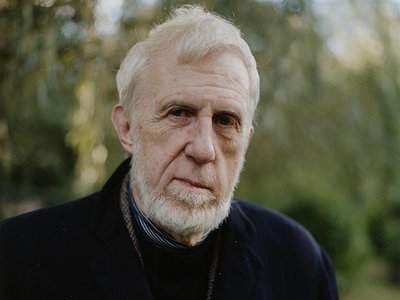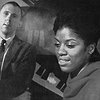Part 1
Name: Ran Blake
Nationality: American
Occupation: Musician / Pianist /Educator
Current Release: The Newest Sound You Never Heard on A-Side Records
Recommendations: Beloved by Toni Morrison/Vertigo by Alfred Hitchock, Pawnbroker by Sidney Lumet/ Whirlpool by Otto Preminger/ Le Boucher by Claude Chabrol
Website/Contact: Visit Ran’s website at ranblake.com
When did you start playing your instrument, and what or who were your early passions and influences? What is it about music and/or sound that drew you to it?
I started playing my instrument at the age of three or four. My very early passions were hearing the music of Prokofiev and of the Gospel church, and becoming a lover of films, such as Robert Siodmak’s “Spiral Staircase” and Alfred Hitchcock. I think what drove my sound was dissonance and the human voice.
For most artists, originality is first preceded by a phase of learning and, often, emulating others. What was this like for you? How would you describe your own development as an artist and the transition towards your own voice? What is the relationship between copying, learning and your own creativity?
Yes, for most artists originality is very important. I think even my enemies say that I am [original]. Transition towards your own voice is important. I don't think I did that work early on in my youth.
I would have the scope of the music I wanted to hear then I would pin it down to listening to the sound of the melody, the shape, its melodic rhythm, and harmony, and usually this would be other people's music that I tried to hear that was not only Afro-American but voice, film music or Prokofiev, Stravinsky.
What were some of your main artistic challenges when starting out as an artist and how have they changed over the years?
When I go outside this field, the learning curve is very challenging. When it comes to artistic challenges, I still have not been really confident about my own musical management. I also feel this challenge working with a rhythm section or in large groups without adequate rehearsal time. And I need a lot. It seems rather ludicrous to my companions who were satisfied with one or two rehearsals and then jump into performance. I have not succeeded in being flexible that way. And the person that has really given me the most musical time besides my mentors such as Gunther Schuller, has been Jeanne Lee who would meet with me on weekends.
Tell us about your studio/work space, please. What were the criteria when setting it up and how does this environment influence the creative process? How important, relatively speaking, are factors like mood, ergonomics, haptics and technology for you?
My workspace in my Marion Street studio has a Falcone grand, a table for students who are taking notes and, thanks to Alice Russell, an electronic piano. I think an important criterion was silence and not having noise interrupting both my composing practice as well as my teaching. I don't really use technology much. I prefer working with one partner or myself on acoustic piano.
Tell me about your instrument, please. What was your first instrument like and how did you progress to your current one? How would you describe the relationship with it? What are its most important qualities and how do they influence the musical results, including your own performance?
I had a couple of upright pianos, even three at one time in a closed-in patio in my parents’ Springfield house. I right now realize one was bought and two were inherited and I do forget the brand names. I mostly lived with uprights until I moved to Brookline and Dorothy Wallace, in great kindness, provided me with the Falcone.
This instrument means the most to me; first it has the sentimental value, having been with me for at least 35 years. It has the touch, the range, the vibrance. The only drawback is the tenor/baritone part of the piano, which is a challenge to keep in tune.
Could you take us through a day in your life, from a possible morning routine through to your work? Do you have a fixed schedule? How do music and other aspects of your life feed back into each other - do you separate them or instead try to make them blend seamlessly?
In summer and the holidays, I often get up early and do routine digital practice or other exercises that help my body away from the piano. There are busy weekdays that I don't keep this routine up.
The most important qualities and how they influence the musical results? Well, I guess the tangible results are positive reviews I’ve received recently. I think this practice and alone-time in the evenings has been very important for my creativity. No longer being a morning person, unless terribly fatigued, I really try to keep things in a routine and get off the piano by 10 o'clock or so and start preparing for my lessons, classes, etc.
Could you describe your creative process on the basis of a piece or album that's particularly dear to you, please? Where did the ideas come from, how were they transformed in your mind, what did you start with and how do you refine these beginnings into the finished work of art?
When I can, I try to see a film either in theatre or on DVD to empty my mind and then the creative work really begins, usually early night and I need to be totally alone for this. Right now, there are two projects that have been very close to me.
The first is the release of the Jeanne Lee album The Newest Sound You Never Heard, A-Side Records. I have to thank Aaron Hartley who's on faculty at New England Conservatory for his input, not on just production and transferring these tapes but on the sequence and getting it out. I also have to thank Hankus Netsky who is co-chair of NEC’s Contemporary Improvisation Department and faculty vocalist Dominique Eade who has been very supportive of Jeanne Lee and wrote the liner notes for this album. I've never forgotten that she gave up some of her own teaching hours in order to bring Jeanne to NEC.
I am also now working on Springfield Streams Suite (A-Side) which will be mostly originals about the town that I grew up in for the first 15 years of my life. Many of my ideas through my career have come from within and many have come from private study with Gunther Schuller, who for 10 years of his life, was our very important president of NEC.
There are many descriptions of the ideal state of mind for being creative. What is it like for you? What supports this ideal state of mind and what are distractions? Are there strategies to enter into this state more easily?
I often listen to artists that I admire such as Bud Powell, Mahalia Jackson, Chris Connor, Abbey Lincoln, then I go to the piano after singing many of the melodies internally and work out details. This jump-starts me and after a while I might go to a composition of my own; it's only semi-related to listening to another person, but this inspires me.
An ideal state of mind and relaxation for creative work is essential. That is why some of my best creative work happens on weekends and evenings when I'm alone. With special help from my colleagues I’m able to be alone. NEC has given me many wonderful rooms with wonderful pianos over the years and having that type of space to work with quality instruments is invaluable.
Strategies for me to get into a deep state of creativity is to do some problem-solving of the things that are interrupting my peace of mind, and then put myself into a sonic-semi-meditative state then storyboard, in my back room often lying down, what I'm going to approach.
Often, I need part of a film to forget disturbing events of the day and then I put myself in the state again and I start storyboarding. Most of the days I’ve done some lubricating of my attention to piano, to my teaching, and even summarizing material I should work on and then forget. I stay in a relaxed state and get to the piano. There are some days that my life is quite a bit more difficult and often the need to sleep can interfere with the creative process.






